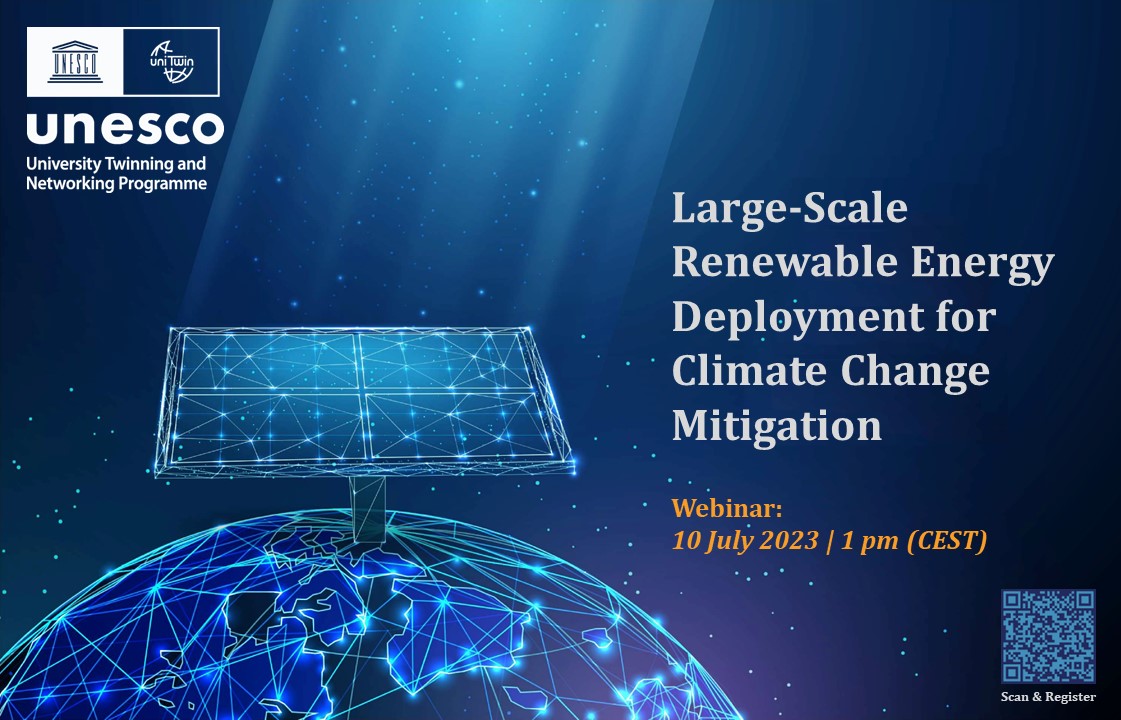
The UNESCO Capacity Building Section, Natural Sciences Sector hosted a webinar on Large-Scale Renewable Energy Deployment for Climate Change Mitigation, on 10 July 2023, as part of its the UNITWIN/UNESCO Chairs Programme.
The event featured speakers who are UNESCO University Chairs in this field from around the world.
Former WFEO President Dr Marlene Kanga AO moderated the panel discussion “Sharing best practices and success stories of Large-Scale Renewable Deployment and Digitalization in Climate change”.
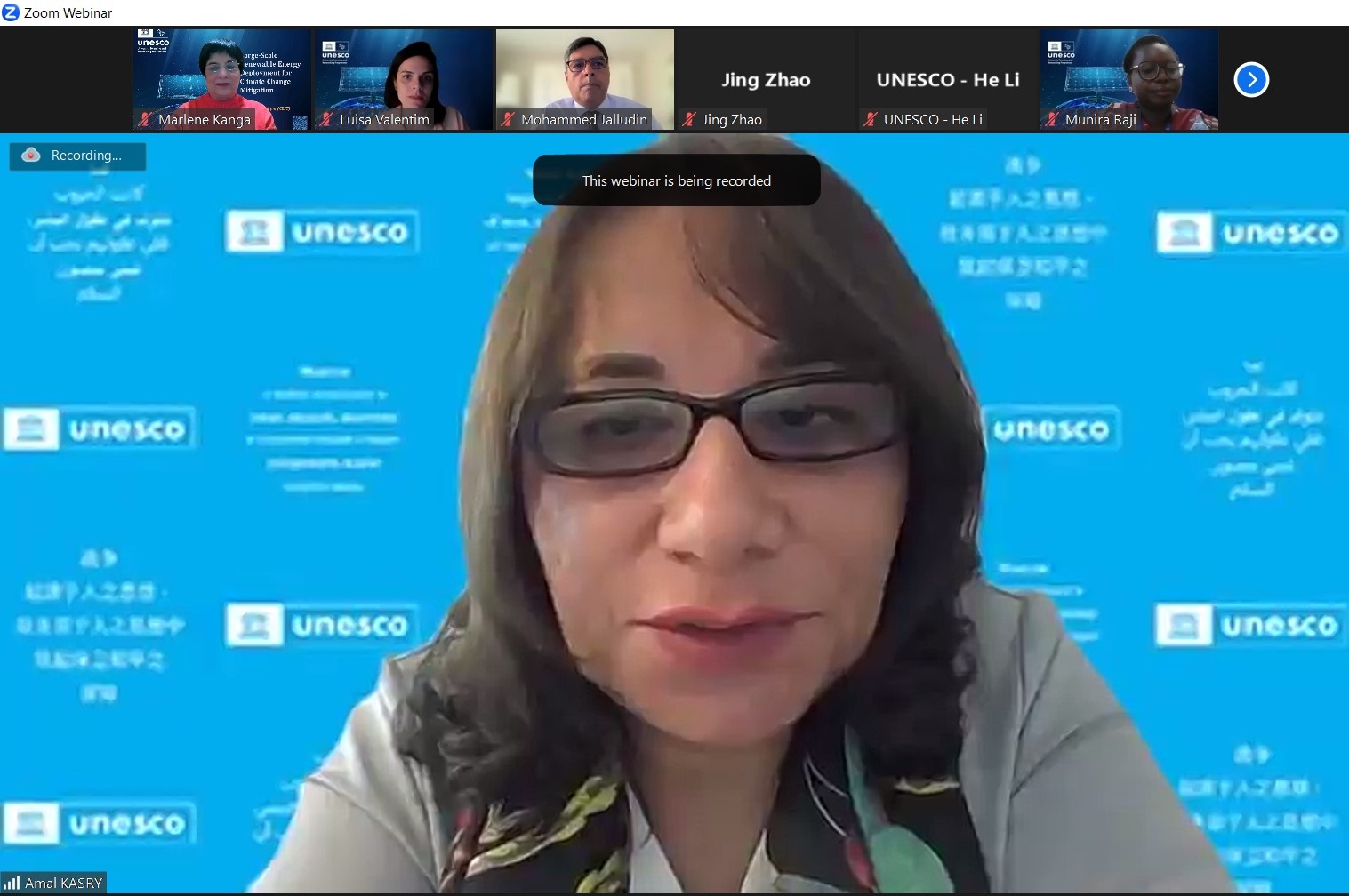
Dr Amal Kasry, Chief of the Basic Science, Innovation, Research and Engineering Section, Natural Sciences Sector, UNESCO, opens the UNESCO UNITWIN Webinar on Large-Scale Renewable Energy Deployment for Climate Change Mitigation, 10 July 2023
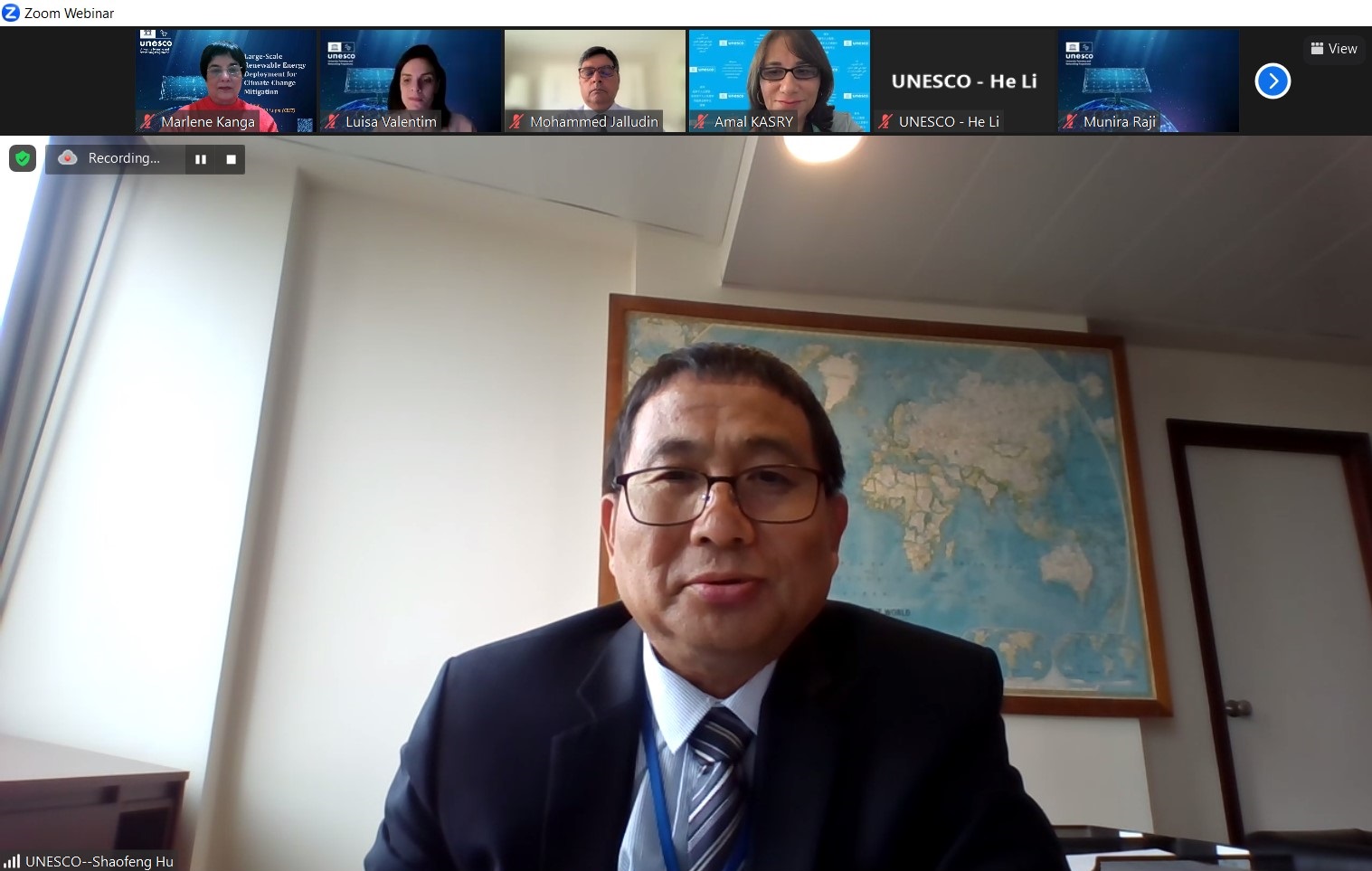
Mr Shaofeng Hu, Director pf the Division of Science Policy and Basic Sciences, Natural Sciences Sector, UNESCO, delivers opening remarks at the UNESCO UNITWIN Webinar on Large-Scale Renewable Energy Deployment for Climate Change Mitigation, 10 July 2023
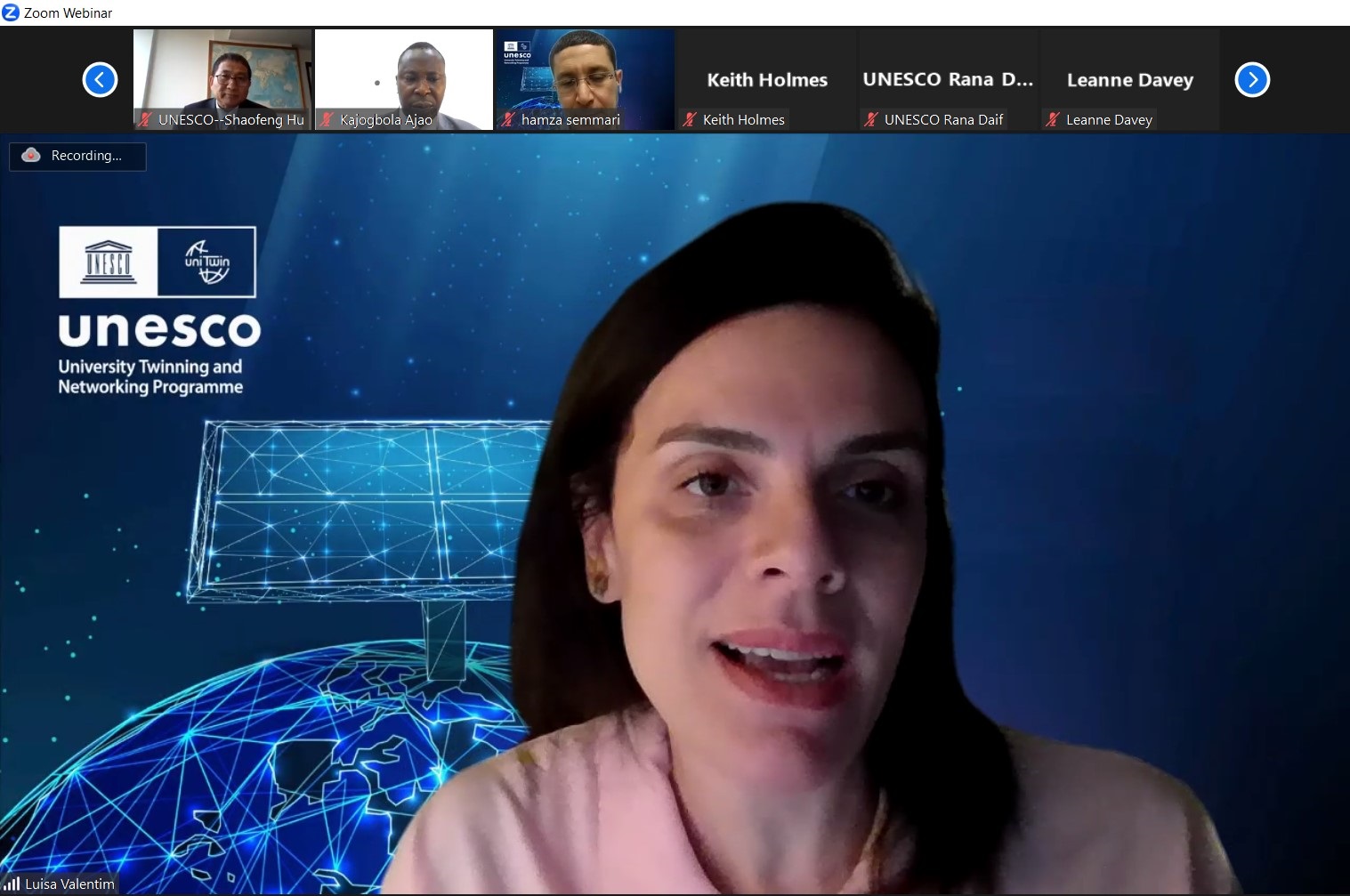
Dr Luisa Barros Valentim, LAC Council of the Engineers for Energy Transition (CEET) Regional Lead, Head of the Consulting Business Development Global – WayCarbon, delivers the keynote address at the UNESCO UNITWIN Webinar on Large-Scale Renewable Energy Deployment for Climate Change Mitigation, 10 July 2023
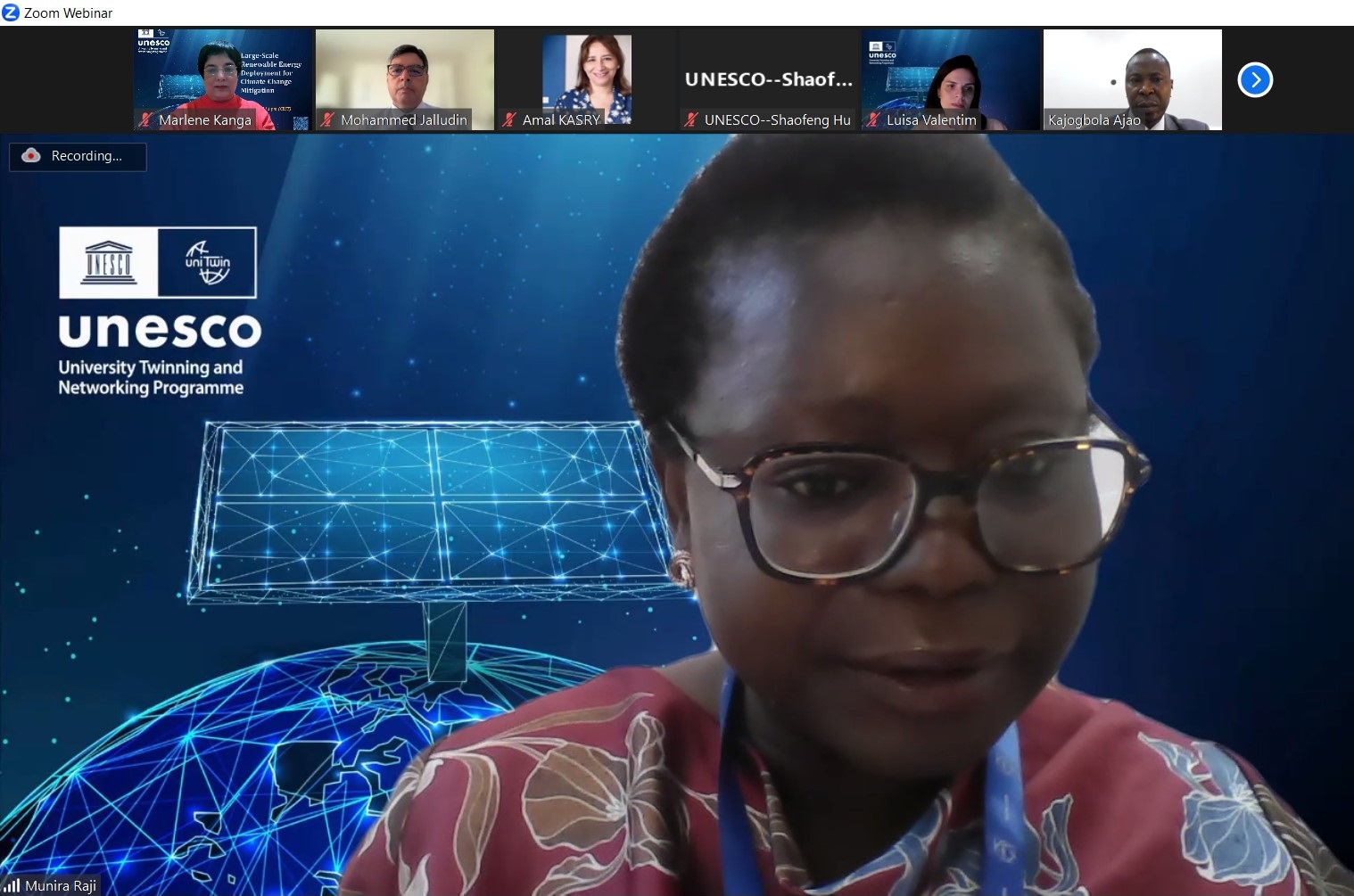
Dr Munira Raji is Research Fellow Sustainable Geoscience and Natural Capital at the University of Plymouth, panellists at the UNESCO UNITWIN Webinar on Large-Scale Renewable Energy Deployment for Climate Change Mitigation, 10 July 2023
Launched in 1992, the UNITWIN/UNESCO Chairs Programme, which involves over 850 institutions in 120 countries, promotes international inter-university cooperation and networking to enhance institutional capacities through knowledge sharing and collaborative work. The programme supports the establishment of UNESCO Chairs and UNITWIN Networks in key priority areas related to UNESCO’s fields of competence – i.e. in education, the natural and social sciences, culture and communication.
The webinar aimed to explore the potential role of large-scale renewable energy deployment for climate change mitigation and to discuss the fundamental science and geophysics behind these technologies. The audience comprised UNESCO Chairs, and other experts, including scientists, researchers, educators, policymakers, and professionals working in the fields of renewable energy, digitalization, geophysics and geology. The event was an opportunity to link the large network of UNESCO Chairs and Category 2 Centers working in these fields with UNESCO programs and partners, and promote collaborative efforts in the coming years.
The speakers and panelists were:
- Professor Rosei Federico, specializing in nanotechnology nanoelectronics nanostructures optoelectronics, and UNESCO Chair in Materials and Technologies for Energy Conversion, Saving and Storage (MATECCS), National Institution for Scientific Resrach Quebec Canada.
- Dr Jalludin Mohammed, General Director of Centre for Energy Research Djibouti, Geothermal expert for the Asal rift geothermal project of EDD , Member of the Scientific Council of IGCP-IUGS Geosciences Programme of UNESCO.
- Dr Munira Raji, Research Fellow Sustainable Geoscience and Natural Capital at the University of Plymouth researching geothermal energy, floating offshore wind energy, emerging clean energy technologies for renewable energy within the UK and overseas.
- Prof Kajogbola Ajao, UNESCO Chair in Alternative Energy, and Director, Centre for Sustainable Energy, Kwara State University, Malete, Nigeria. His research interest covers Renewable Energy Systems, Energy Modelling, Energy Efficiency and Reverse Engineering.
- Associate Professor Hamza Semmari, Algerian team leader for the UNESCO-IGCP636 project “Geothermal resources for energy transition” (UNESCO International Geoscience Programme) and is based at the Ecole Nationale polytechnique de Constantine- Algeria.
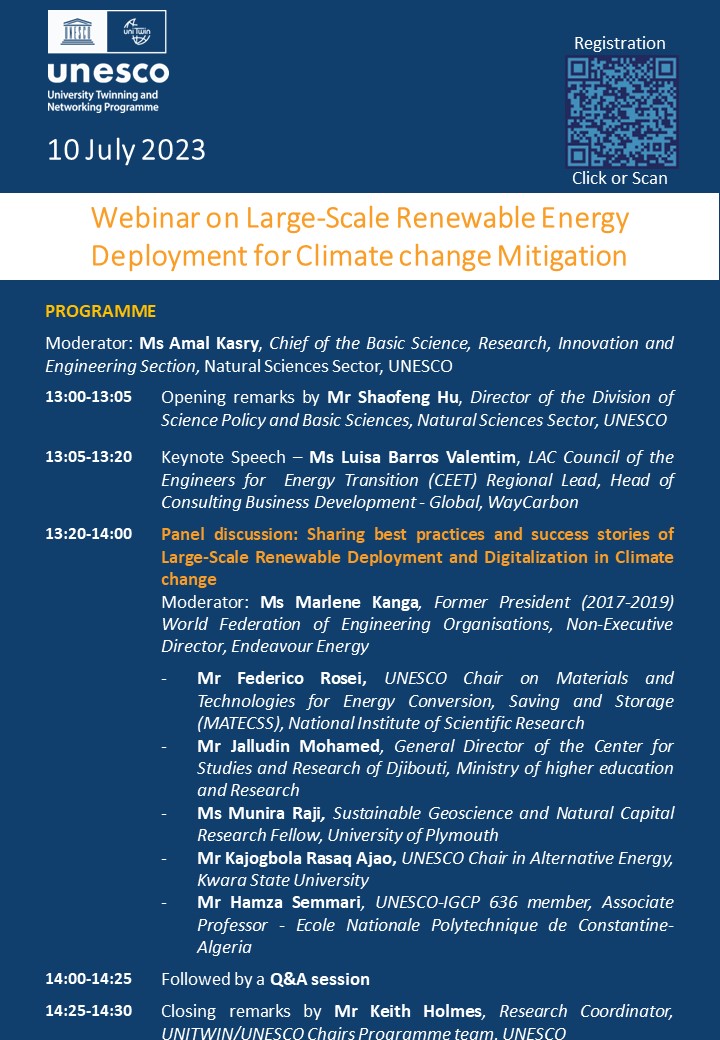
Program for UNESCO UNITWIN Webinar on Large-Scale Renewable Energy Deployment for Climate Change Mitigation, 10 July 2023
The Program in French is available in this link.
The webinar identified future trends and new opportunities of large-scale renewable energy deployment and digitalization in climate change mitigation, discussed the impact and challenges of large-scale renewable energy deployment and digitalization in climate change mitigation and shared best practices and success stories of large-scale renewable energy deployment and digitalization in climate change mitigation.
The event was an opportunity to facilitate discussion and collaboration among experts, especially UNESCO Category 2 Centers and UNESCO Chairs, in these fields. The presentations, moderation, and participation were inspiring, thought-provoking, and highly informative. The event had a total of 728 registrations from 87 countries around the world.
The recording in English is available by clicking on the below image.
The recording in French is available by clicking on the below image.
Article Contributed by Dr Marlene Kanga, WFEO President 2017-2019.
For more information:
The event is a part of a series of webinars
JUL
2023
